Voices of the Past
By Brian Wilson
Regular readers may recall that my round-ups used to include frequent
reviews of recordings from Beulah and Naxos Archives, made from 78s and LPs
up to the European copyright date of 1962. In addition to download-only
material from those and other sources, it is still possible to obtain
recordings deleted on CD, not just as downloads, but, in some cases, as
specially licensed CDRs from Presto, while Chandos and Hyperion also offer
special CDRs (and downloads) of their deleted CDs.
Index:
BARBER
Essence of – Beulah
BRAHMS
Symphony No.3 – Schuricht (rec. live 1963) – Legendary Archives
BRUCKNER
Symphony No.3; Richard STRAUSS Tod und Verklärung
– Knappertsbsuch (rec live 1964) – Legendary Archives
GAY
Beggar’s Opera – Sargent – Beulah
GOMBERT
Music from the Court of Charles V – Sony/Presto
HANDEL
Arias – Ferrier, McKellar – Beulah
JONES
Symphonies Nos. 3 and 5 – Thomson – Lyrita
MAHLER
Symphony No.5 – Konwitschny (live 1960) – Legendary Archives
- Symphony No.7 – Kubelík (live 1960) – Legendary Archives
PROKOFIEV
Cinderella
– Pletnev – DG/Presto
RODRIGO
Concierto de Aranjuez
– Yepes/Argenta (with solo guitar music – John Williams) – Beulah
SHOSTAKOVICH
Symphony No. 5 – Ormandy (live 1958) – Legendary Archives
- Symphony No.8 – Haitink – Decca/Presto CD; Silvestri (live 1958) –
Legendary Archives.
- Symphony No.12 – Ivanov (live 1961) – Legendary Archives
SIMPSON
Symphonies Nos. 5 and 6 – Davis, Groves – Lyrita
 VAUGHAN WILLIAMS
– Tallis Fantasia; Symphony No.5 – Bush (1953, 1955) – Legendary Archives
VAUGHAN WILLIAMS
– Tallis Fantasia; Symphony No.5 – Bush (1953, 1955) – Legendary Archives
Adagio
– 10 Slow Movements – Beulah
Brendel
– Early Recordings (vols. 1-3) – Beulah
Elijah Rock
– Mahalia Jackson – Beulah
Organ of the Tower Ballroom, Blackpool – Dixon - Beulah
***
Beulah

I have quite a bit of catching up to do since my last survey of Beulah
reissues in November 2020.
 I imagine that more people will have heard of at least some of the music
from the Bertolt Brecht/Kurt Weil Dreigroschenoper, or Threepenny
Opera (‘Mack the Knife’ ring a bell?) than of its model, John GAY’s Beggar’s Opera, put together in 1728
with music by Johann Christoph Pepusch, largely arranged
from ballad songs and snatches. It doesn’t get too many outings, though, by
coincidence, I see that a DVD/blu-ray recording, featuring Les Arts
Florissants and William Christie, has just been released on the Opus Arte
label. I haven’t seen that, so my benchmark remains the 2-CD 1991 Hyperion
recording directed by Jeremy Barlow (CDA66591/2 – Archive Service or
download with pdf booklet from
hyperion-records.co.uk).
I imagine that more people will have heard of at least some of the music
from the Bertolt Brecht/Kurt Weil Dreigroschenoper, or Threepenny
Opera (‘Mack the Knife’ ring a bell?) than of its model, John GAY’s Beggar’s Opera, put together in 1728
with music by Johann Christoph Pepusch, largely arranged
from ballad songs and snatches. It doesn’t get too many outings, though, by
coincidence, I see that a DVD/blu-ray recording, featuring Les Arts
Florissants and William Christie, has just been released on the Opus Arte
label. I haven’t seen that, so my benchmark remains the 2-CD 1991 Hyperion
recording directed by Jeremy Barlow (CDA66591/2 – Archive Service or
download with pdf booklet from
hyperion-records.co.uk).
From an earlier period comes the Beulah reissue of the 1955 recording
conducted by Sir Malcolm Sargent, with the Pro Arte Chorus and Orchestra
and an almost predictable cast for the time: Elsie Morison, Constance
Shacklock, Anna Pollak, Monica Sinclair, Alexander Young, John Cameron,
Owen Brannigan and Ian Wallace (10PD13 [1:27:20]). The
Hogarth painting on the cover, predictably, features on both recordings,
but they part company in that Sargent uses the Austin edition while Barlow
returns to the earthier original, with the Bowdlerised bits un-Bowdlerised.
Unlike the Italian-texted operas of Handel, the Beggar’s Opera
relies on spoken text in the vernacular, much of it replete with satire and
humour that meant a great deal to the audiences of the time, but now
requires footnotes, like Pope’s Dunciad, which makes it less
immediately accessible to a modern audience. (I nearly said ‘boring’, but
that would have given away the reason why my C18 paper earned me the lowest
mark in finals.) We can listen to and enjoy Judas Maccabæus
without knowing that the conquering hero was inspired by the Duke of
Cumberland and his role in putting down the 1745, but to hear the Beggar’s Opera in its original form is as if listeners 300 years
hence were to listen to an opera while scratching their heads over references
to Donald Trump, QAnon, Boris Johnson and the pandemic.
So, the Hyperion is more authentic and better recorded, in stereo, contains
an hour more of the work, and comes with a pdf booklet containing the text,
but I suspect that most modern listeners would prefer the much livelier
older Sargent recording, as well transferred as it is by Beulah. Among the
virtues of the older recording are the occasional interventions, as if from
the original audience. The Hyperion download costs £16.99 (link above), the
Beulah £11.99 in lossless sound from
Qobuz
or £7.99 in mp3 from
AmazonUK.
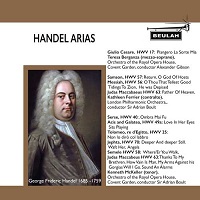 There’s a good deal of Kathleen Ferrier on an album of HANDEL Arias (1PS89 [69:48]): Samson – ‘Return, O God of Hosts’; Messiah – ‘O thou that
tellest’; ‘He was despised’; Judas Maccabæus – ‘Father of Heaven’,
with the London Philharmonic Orchestra and Sir Adrian Boult. This is plain
singing, without any of the modern attempts to reproduce the ornamentation
of Handel’s day, the Messiah just as printed in the old Ebenezer
Prout edition. I don’t normally warm to Ferrier’s voice, for reasons which
I’ve gone into many times, but this was one of the recordings where the
engineers caught her at her best, so popular on LP that Decca later
re-recorded the accompaniment in stereo, but this (1952, mono) original is
preferable. Her work as a telephonist would already have ironed the
Lancashire vowels out of her voice, but there’s still a hint of her native
Walton-le-Dale in ‘behold your God’.
There’s a good deal of Kathleen Ferrier on an album of HANDEL Arias (1PS89 [69:48]): Samson – ‘Return, O God of Hosts’; Messiah – ‘O thou that
tellest’; ‘He was despised’; Judas Maccabæus – ‘Father of Heaven’,
with the London Philharmonic Orchestra and Sir Adrian Boult. This is plain
singing, without any of the modern attempts to reproduce the ornamentation
of Handel’s day, the Messiah just as printed in the old Ebenezer
Prout edition. I don’t normally warm to Ferrier’s voice, for reasons which
I’ve gone into many times, but this was one of the recordings where the
engineers caught her at her best, so popular on LP that Decca later
re-recorded the accompaniment in stereo, but this (1952, mono) original is
preferable. Her work as a telephonist would already have ironed the
Lancashire vowels out of her voice, but there’s still a hint of her native
Walton-le-Dale in ‘behold your God’.
For all that I find this a better representation of Ferrier, the opening
track, the aria from Giulio Cesare – ‘Piangero la sorte mia’, sung
by Teresa Berganza (rec. c.1960, stereo), is more impressive.
The rest of the recital concentrates on Kenneth McKellar, with Boult again
conducting: ‘Ombra mai fu’ (Serse); ‘Love in her eyes sits
playing’ (Acis and Galatea); ‘Did you not hear my lady’ (a modern
confection after music from Ptolemy); ‘Where’er you walk’ (Semele), three extracts from Judas Maccabæus and three
from Jephtha. A fine voice, not helped by its employment in the
more popular
 repertoire with which McKellar was associated, which perhaps
explains some of the occasional strain on the longer-held top notes. These
recordings date from 1959 or 1960 and are in decent stereo. Lossless sound
from
Qobuz.
repertoire with which McKellar was associated, which perhaps
explains some of the occasional strain on the longer-held top notes. These
recordings date from 1959 or 1960 and are in decent stereo. Lossless sound
from
Qobuz.
Reginald Dixon at the Wurlitzer Organ of Tower Ballroom Blackpool
will bring back many memories for those who, like me as a child, regarded a
trip to Blackpool as a real treat, and a visit to the people’s palace of
the Tower Ballroom to see the mighty organ rise from below the floor an
absolute delight. Later, I came to prefer the more genteel Lytham St Anne’s
with its second-hand bookshops, but this Beulah recording of popular
classics and middle-of-the-road music made between 1935 and 1961, is real
trip down memory lane, which I seem to have missed when it was released in
December 2019.
(1PS55, mp3 from
AmazonUK; lossless sound from
Qobuz).
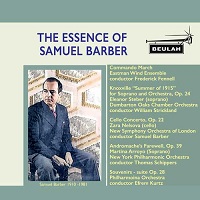 The Essence of Samuel BARBER
on 1PS87 [75:29] – mp3 from
AmazonUK; lossless sound from
Qobuz
– contains some familiar music and some unfamiliar. The short opening Commando March [3:10] comes from the Eastman Wind Ensemble
and Frederick Fennell, whose recordings are to be found on several Beulah
reissues.
The Essence of Samuel BARBER
on 1PS87 [75:29] – mp3 from
AmazonUK; lossless sound from
Qobuz
– contains some familiar music and some unfamiliar. The short opening Commando March [3:10] comes from the Eastman Wind Ensemble
and Frederick Fennell, whose recordings are to be found on several Beulah
reissues.
Knoxville – Summer of 1915
[13:59] is much more familiar, though I don’t recall hearing this recording
from Eleanor Steber (soprano), the Dumbarton Oaks Orchestra and William
Strickland before. This beautiful 1947 evocation of small-town life before
the US entered WWI was commissioned by Steber, and this recording, from US
Columbia, apparently dates from 1950 – if so, it has come up extremely well
in this transfer. There are more recent performances with more beautiful
solo singing, notably from Dawn Upshaw, and in better sound, but this
performance by the soprano who commissioned the work is special. I don’t
think it was issued in the UK until it appeared on a now defunct CBS
Masterworks Portrait CD in 1991.
The Cello Concerto (1946) – Zara Nelsova (cello), New
Symphony Orchestra of London conducted by the composer [27:25] – is also
fairly familiar Barber territory, as is this recording, which also dates
from 1950, this time for Decca and released on a 10” LP. With a soloist who
was already associated with the work, the composer conducting, and a good
transfer of the recording, this is the highlight of the reissue. As
released on Ace of Clubs in 1966, with Symphony No.2, this was my
introduction to the work, even at a time when I was turning my nose up at
mono reissues; Decca were already reissuing some of their prime stereo
recordings on Ace of Diamonds by then.
The album is rounded off with a powerful performance of Andromache’s Farewell, Op.39 [12:09] – Martina Arroyo
(soprano), New York Philharmonic Orchestra and Thomas Schippers (1963, but
not released in the UK at the time, perhaps a little too much like film
music) – and the least familiar item (to me) the Souvenirs Suite, Op.28 [18:44] (Philharmonia
Orchestra/Efrem Kurtz). Like Knoxville, the original Souvenirs ballet inhabits a pre-WWI world, this time in grand
society. There is no other current generally available recording, so this
reissue of one side of a 1956 HMV 10” LP is welcome, though I can’t claim
that this is music of the same quality as the two central works; it’s a bit
like Ravel’s la Valse without the irony. Though mostly of somewhat
venerable origin, these transfers really are worth purchasing from
Qobuz
in lossless sound, though they are also available from
AmazonUK
in mp3: both cost the same (£7.99).
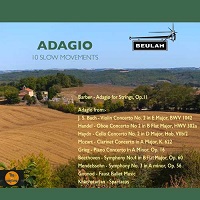 I know there is a ready market for snippet recordings; much as I would like
to think them a stepping stone to full symphonies, concertos or operas,
that’s as far as many are prepared to go. Designed to appeal to that market
is Adagio: 10 slow movements on 1PS90 [72:41]. Only the opening Samuel BARBER Adagio [7:44] was composed as a
stand-alone item. The cover doesn’t specify the provenance of any of these
recordings, but this is the idiomatic recording made by the Philadelphia
Orchestra and Eugene Ormandy – the information is in the codec if your
player can display it. (The free MusicBee programme can.)
I know there is a ready market for snippet recordings; much as I would like
to think them a stepping stone to full symphonies, concertos or operas,
that’s as far as many are prepared to go. Designed to appeal to that market
is Adagio: 10 slow movements on 1PS90 [72:41]. Only the opening Samuel BARBER Adagio [7:44] was composed as a
stand-alone item. The cover doesn’t specify the provenance of any of these
recordings, but this is the idiomatic recording made by the Philadelphia
Orchestra and Eugene Ormandy – the information is in the codec if your
player can display it. (The free MusicBee programme can.)
The closing
Aram KHACHATURIAN Adagio of Spartacus and Phrygia
[9:07], from the Spartacus ballet, also developed a life of its
own when it was used as the theme music for a TV programme about a shipping
family, The Onedin Line. The music actually has nothing to do with
a ship under full sail, but it seemed to fit perfectly, in this recording
made by the composer with the Vienna Philharmonic Orchestra, still
available on the MVE label, download only, and short value with just 23
minutes from the ballet. Better to choose the Beulah.
The slow movement of the GRIEG Piano Concerto [6:00] in
one of my favourite recordings, from Clifford Curzon, the LSO and Øivind
Fjeldstad (1959), is another highlight of the collection, but it also
serves to point the listener to their complete recording, with the Schumann
Piano Concerto and Franck Symphonic Variations (Decca 4336282) or on a
Presto special CD
with Peer Gynt Suites (4485992). And who could fail to enjoy Sir
Thomas Beecham’s special magic with the Adagio from the Faust ballet music on the next track [4:16]?
Another old favourite, Maurice Gendron and Pablo Casals in the slow
movement of the HAYDN Cello Concerto in D, now known as
No.2 since the discovery of the concerto in C, also points to the complete
recording on another Beulah release, Great Cello Concertos. mp3
from
AmazonUK;
lossless sound from
Qobuz
Among the recent highlights from this label are three recordings made by
the young Alfred Brendel. What they lack in maturity and recording quality,
they more than make up for in sheer vitality:
 1PS86
contains BEETHOVEN Fantasy in g minor, LISZT Piano Concertos Nos. 1 and 2 (with Vienna Pro
Musica/Michael Gielen) and MOZART Quintet for piano and
winds, K452 (with Hungarian Wind Quintet), rec. 1957-62. Download from
AmazonUK
(mp3) or
Qobuz
(lossless).
1PS86
contains BEETHOVEN Fantasy in g minor, LISZT Piano Concertos Nos. 1 and 2 (with Vienna Pro
Musica/Michael Gielen) and MOZART Quintet for piano and
winds, K452 (with Hungarian Wind Quintet), rec. 1957-62. Download from
AmazonUK
(mp3) or
Qobuz
(lossless).
We have just been reminded of the power of a young pianist’s Liszt in a
recital by Benjamin Grosvenor which includes the Piano Sonata (Decca). Ian
Julier has given that a Recommended accolade (pending), and I’m very happy
to concur with his very high opinion, but I’m equally happy to agree with
another new recruit to our team, David McDade, who thought these Liszt
concertos superb and the Mozart formidable –
review.
And, though I’ve mentioned the recording quality of the Vox recordings,
the sound has come up very well in this Beulah transfer.
 2PS86: This is less familiar Brendel territory – MUSSORGSKY
Pictures from an Exhibition, STRAVINSKY Three Movements
from Petrushka, BALAKIREV Islamey andLISZT Harmonies poétiques et réligieuses: Invocation and Pensée des Morts, all recorded in 1955.
Download from
AmazonUK
(mp3) or
Qobuz
(lossless).
2PS86: This is less familiar Brendel territory – MUSSORGSKY
Pictures from an Exhibition, STRAVINSKY Three Movements
from Petrushka, BALAKIREV Islamey andLISZT Harmonies poétiques et réligieuses: Invocation and Pensée des Morts, all recorded in 1955.
Download from
AmazonUK
(mp3) or
Qobuz
(lossless).
Like most listeners, I find the Mussorgsky in the original piano version
something of a let-down after the Ravel and other orchestrations, but
Brendel does his best to add colour to the playing, both here and in the
Stravinsky, where orchestral music is re-imagined for the piano. Once
again, my colleague David McDade puts his finger on the matter – review
pending – by noting that Brendel looks carefully at each piece and
penetrates its meaning. Islamey is more of a show piece, and
doesn’t bring out the best in Brendel, but the Liszt finds him at home
again. These are older than the recordings on Volume 1 and, inevitably,
sound a little dry, but the transfer has, again, been judiciously made.
 3PS86: BEETHOVEN Piano Concerto No.5 in E-flat, Op.73,
‘Emperor’ (rec. 1961, with Vienna Pro Musica and Zubin Mehta),LISZT Harmonies No.10 Cantique, and MOZART Concerto No.10 for two pianos and orchestra, K365
(with Walter Klien, VSOO and Paul Angerer). Download from
AmazonUK
(mp3) or
Qobuz
(lossless).
3PS86: BEETHOVEN Piano Concerto No.5 in E-flat, Op.73,
‘Emperor’ (rec. 1961, with Vienna Pro Musica and Zubin Mehta),LISZT Harmonies No.10 Cantique, and MOZART Concerto No.10 for two pianos and orchestra, K365
(with Walter Klien, VSOO and Paul Angerer). Download from
AmazonUK
(mp3) or
Qobuz
(lossless).
This recording of the Emperor has been through several transmogrifications since it
was first released on Vox STGBY512050. The ever-reliable Trevor Harvey
deemed the (1968) Turnabout reissue the work of ‘a very fine pianist who is
also intelligent to a high degree’. I’m not about to disagree with that,
except to note that the recording is a little on the dry side.
Brendel and Klien between them recorded several of the Mozart Piano
Concertos for Vox, so it’s appropriate that they paired up for K365.
Another of the reliable old reviewers, Jeremy Noble, dubbed this recording
‘astonishing and delightful … music making’. (It’s a sad indication of my
age that I remember reading the original review in 1961.) Once again, I’m
not likely to disagree with that summary. I praised the Beulah reissue of
Klien’s Mozart Piano Concerto No.14 when it was released separately in 2013
–
review
– and it’s equally worth having on Great Piano Concertos (with
Beethoven No.4, Backhaus, and Chopin No.2, Askenase – download or stream
from
Qobuz). Though Brendel received better recording quality when he was taken up by
Vanguard – see my
review
of Mozart Piano Concertos Nos. 9 and 14 – the Vox recording of K365 is
more than tolerable in this transfer.
 An anthology entitled Classical Guitar (1PS88 [71:57]) just had to include the RODRIGO Concierto de Aranjuez, here offered in
one of the classic recordings, by Narciso Yepes, Orquesta Nacional de
España and Ataulfo Argenta (DG, stereo, 1957). That’s a recording which has
stood the test of time well – it’s still one of my versions of choice. Here
it sits well in the company of solo guitar music recorded by John Williams
in 1958: Albeniz, Ponce, Villa-Lobos, Sor, Segovia, Granados and
others. It’s also available on a budget Alto CD, ALC1379, with Rodrigo’s Fantasia para un Gentilhombre (Yepes again, with Frühbeck de
Burgos) and the Concierto serenata for harp and orchestra
(Zabaleta and Märzendorfer). This recording of Aranjuez has also
appeared on an earlier Beulah release, Guitar Concerto –
DL News 2014/2.
Choose the coupling according to your preference. Download from
AmazonUK
(mp3) or
Qobuz
(lossless).
An anthology entitled Classical Guitar (1PS88 [71:57]) just had to include the RODRIGO Concierto de Aranjuez, here offered in
one of the classic recordings, by Narciso Yepes, Orquesta Nacional de
España and Ataulfo Argenta (DG, stereo, 1957). That’s a recording which has
stood the test of time well – it’s still one of my versions of choice. Here
it sits well in the company of solo guitar music recorded by John Williams
in 1958: Albeniz, Ponce, Villa-Lobos, Sor, Segovia, Granados and
others. It’s also available on a budget Alto CD, ALC1379, with Rodrigo’s Fantasia para un Gentilhombre (Yepes again, with Frühbeck de
Burgos) and the Concierto serenata for harp and orchestra
(Zabaleta and Märzendorfer). This recording of Aranjuez has also
appeared on an earlier Beulah release, Guitar Concerto –
DL News 2014/2.
Choose the coupling according to your preference. Download from
AmazonUK
(mp3) or
Qobuz
(lossless).
 One of Beulah’s specialities, military music, is represented here only by
the opening work in the Barber anthology, but another speciality, jazz, is
here in force in the form of 1PS92: Mahalia Jackson – Elijah Rock. As well as the title
work, the collection includes
He’s got the whole World in His Hands, When the Saints go marching in
(even livelier than Louis Armstrong), What a Friend we have in Jesus, Amazing Grace and Joshua fit the Battle of Jericho. Recorded between 1937 and 1959,
mostly live, the sound is inevitably variable, but the vivid Beulah
transfers make it all eminently listenable.
One of Beulah’s specialities, military music, is represented here only by
the opening work in the Barber anthology, but another speciality, jazz, is
here in force in the form of 1PS92: Mahalia Jackson – Elijah Rock. As well as the title
work, the collection includes
He’s got the whole World in His Hands, When the Saints go marching in
(even livelier than Louis Armstrong), What a Friend we have in Jesus, Amazing Grace and Joshua fit the Battle of Jericho. Recorded between 1937 and 1959,
mostly live, the sound is inevitably variable, but the vivid Beulah
transfers make it all eminently listenable.
My next project is an article on recordings for Passiontide and Easter, new
releases for 2021 and older favourites, including a new version for Alpha
of Handel’s Brockes Passion. The spiritual power of this Mahaliah
Jackson collection could easily merit a place in that collection. It wasn’t
yet available at the time of reviewing it; watch out for its appearance on
the Beulah webpage, and choose the Qobuz lossless download for preference.
***
Lyrita

For some time, in addition to their new recordings and
very valuable reissues from the LP
age, a treasure trove mainly of British music, Lyrita have been bringing us
excellent transfers from radio broadcasts made by their founder, Richard
Itter, and other broadcast recordings by arrangement with the BBC. Two
recent additions to those off-air refurbishments are especially well worth
getting to know, on CD or as downloads.
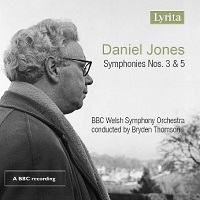 Daniel
JONES (1922-1993) Symphony No.3
(1951), rec. 26 January 1990 [28:29] and Symphony No.5
(1958), rec. 9 February 1990 [39:33]: BBC Welsh Symphony Orchestra/Bryden
Thomson, ADD/stereo. LYRITA SRCD.390 [68:03]. Reviewed as
downloaded from lossless press preview. CD from
Presto
or
Amazon UK.
Daniel
JONES (1922-1993) Symphony No.3
(1951), rec. 26 January 1990 [28:29] and Symphony No.5
(1958), rec. 9 February 1990 [39:33]: BBC Welsh Symphony Orchestra/Bryden
Thomson, ADD/stereo. LYRITA SRCD.390 [68:03]. Reviewed as
downloaded from lossless press preview. CD from
Presto
or
Amazon UK.
I closed my
review
of SRCD.364 – Symphonies Nos. 2 and 11 – with the hope that there was more
in the pipeline. Here it is, and it’s very welcome: music immediate in
appeal, yet powerful and genuinely symphonic in scope. Lyrita already had
recordings of some of the other symphonies: as well as the album referred
to above there’s Nos. 1 and 10, another BBC recording, on SRCD.358, Nos. 4,
7 and 8 on SRCD.329, and 6 and 9 on SRCD.326.
 Robert SIMPSON (1921-1977) Symphony No.5
(1972): LSO/Andrew Davis, rec. 3 May 1973 [38:53] and Symphony No.6. (1977): LPO/Charles Groves, rec. 8 April
1980 [33:12], both ADD/stereo. LYRITA SRCD.389 [72:05]
Reviewed as downloaded from lossless press preview. CD from
AmazonUK.
Robert SIMPSON (1921-1977) Symphony No.5
(1972): LSO/Andrew Davis, rec. 3 May 1973 [38:53] and Symphony No.6. (1977): LPO/Charles Groves, rec. 8 April
1980 [33:12], both ADD/stereo. LYRITA SRCD.389 [72:05]
Reviewed as downloaded from lossless press preview. CD from
AmazonUK.
I’ve never quite come to terms with Robert Simpson, though I’ve listened to
and enjoyed the Hyperion series of his symphonies (CDS44191/7, 7 CDs or download, and separately as downloads) and chamber music, so I
was pleased that David McDade volunteered to review this release (review
pending). He was so impressed with No.5 that he has awarded Recommended
status, though he felt that No.6 had not received enough rehearsal time.
So, a challenge to the Hyperion No.5 (Vernon Handley with the RPO), though
Handley, with the RLPO, reigns supreme in No.6.
***
Presto CDR

From modest beginnings, Presto’s range of CDRs, licensed from the major
manufacturers, has grown to be considerable. Although most of the albums
are also available as downloads or for streaming, which is how I have
reviewed them, I know that many music lovers like to have the physical CD
with its booklet, the latter sadly all too often missing from the download.
You’ll find reviews of many of these Presto specials on our main review
pages, but I wanted to draw attention to the series and pick out a few here
that we seem to have missed.
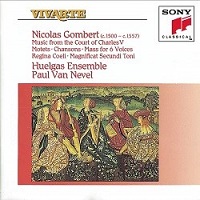 I haven’t reviewed many of these Presto CDRs in physical form, but I did
very much appreciate the reissue of a Sony recording of the music of GOMBERT – Music from the Court of Charles V (SK48249 –
review). As with many of these Presto reissues, the inclusion of the booklet,
with texts and translations, identical to the original, and absent from any
download that I could find, is especially valuable.
I haven’t reviewed many of these Presto CDRs in physical form, but I did
very much appreciate the reissue of a Sony recording of the music of GOMBERT – Music from the Court of Charles V (SK48249 –
review). As with many of these Presto reissues, the inclusion of the booklet,
with texts and translations, identical to the original, and absent from any
download that I could find, is especially valuable.
Sergei PROKOFIEV (1891-1953)
Summer Night: Suite from The Duenna, Op.123 [20:13]
Cinderella, Op.87 [1:56:49]
Russian National Orchestra/Mikhail Pletnev
rec. 13 April 1994, Great Hall, State Conservatory, Moscow. DDD
Presto CD or download
DEUTSCHE GRAMMOPHON 4762233
[2 CDs - 2:16:44]
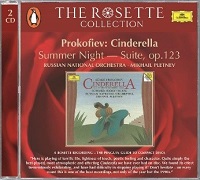
A complete recording of Cinderella, as opposed to the suites, is rare, and
the Summer Night Suite almost as rare. Add the fact that Presto
have given us two CDs for their regular price of £12.75, when the lossless
download costs more than that, bear in mind that this is a ‘Rosette
Collection’ album, a 3-star Penguin Classics recommendation, and you are
looking at a genuine bargain. The only rival comes from Vladimir Ashkenazy
with the Cleveland Orchestra (1983) on a Double Decca, with Glazunov The Seasons, a slightly less expensive proposition on CD at around
£11.50 and significantly less expensive as a download for around £10
(4553492).
Even when it was at full price, the Pletnev had an edge on other
recordings. At the price of the Presto CD, it’s unbeatable – unless you
must have the Glazunov, which, I must admit, is music that I turn to often.
You could download that separately from the Double Decca for around £4.
 Dmitri SHOSTAKOVICH (1906-1975)
Dmitri SHOSTAKOVICH (1906-1975)
Symphony No.8 in c minor, Op.65 (1943) [61:42]
Royal Concertgebouw Orchestra/Bernard Haitink
rec. 1982.
Presto CD or download
DECCA 4116162
[61:42]
I’ve written (below – Legendary Archives) about the great disappointment
that this symphony caused in 1943. The authorities, who had been hoping for
something optimistic as the war was beginning to turn, made the best of a
bad job and dubbed it a memorial for the victims of Stalingrad – it’s more
likely to be for the victims of Stalin himself, but you dare not even think
that in Russia in 1943.
This Haitink recording has been through several metamorphoses on CD; the
Presto CDR restores the catalogue number and cover of the first of them. At
one time it was a budget-price offering on the Eloquence label, and it’s
still available at mid-price on Decca Virtuoso, but that’s advertised as
out of stock at the UK distributors, and the lossless download, at £11.11,
is more expensive than the CD, leaving the Presto CD your best option. It’s
a safe option, too, with a fine performance from all concerned, and well
recorded, and I found myself preferring it to Ashkenazy in his complete
Shostakovich set –
review
– now download only. It’s just a little tame, however, by comparison with
Mravinsky on budget-price Alto and the live Silvestri recording from
Legendary Archives (details of both below).
I’ve mentioned some Presto Britten-conducts-Britten recordings in
my recent
overview of Decca and DG releases:
 English Music for Strings:
English Music for Strings:
Henry PURCELL (1659-1695)
Ciacona in g minor, Z.730 (arr. Britten) [6:59]
Sir Edward ELGAR (1857-1934)
Introduction and Allegro for strings, Op.47 (1905)1 [14:09]
Benjamin BRITTEN (1913-1976)
Prelude & Fugue for 18 strings, Op.29 [9:12]
Simple Symphony, Op.4 [17:16]
Frederick DELIUS (1862-1934)
(orch. Eric Fenby) Two Aquarelles (1917.1932) [5:14]
Frank BRIDGE (1879-1941)
Christmas Dance ‘Sir Roger de Coverley’ [4:27]
Cecil Aronowitz (viola), Emanuel Hurwitz (violin), José Luis Garcia
(violin), Bernard Richards (cello)1
English Chamber Orchestra/Benjamin Britten
rec. May and December 1968, September 1971, Maltings, Snape. ADD
Reviewed as streamed in 16-bit lossless sound.
Presto CD
or download
DECCA 4761641
[57:19]
 The Young Person’s Guide to the Orchestra, Op.341 [16:34]
The Young Person’s Guide to the Orchestra, Op.341 [16:34]
Peter Grimes
(1945): Four Sea Interludes and Passacaglia, Op.33a2 [23:21]
Soirées musicales
(after Rossini), Op.93 [9:34]
Matinées musicales
(after Rossini), Op.243 [13:15]
London Symphony Orchestra/Benjamin Britten1; Royal Opera House
Covent Garden/Benjamin Britten2; National Philharmonic
Orchestra/Richard Bonynge3
rec. May 1963, Kingsway Hall, London, ADD1; December 1958,
Walthamstow Assembly Hall, London, ADD2; March 1981, Kingsway
Hall London, DDD3
Presto CD
or download
DECCA 4256592
[62:44]
See the Decca and DG Article for details (link above).
***
Legendary Archives

The raison d’être of this label, which I have only just encountered, is
rather different. Most of the albums which they offer are not reissues of
commercial releases but previously unpublished live recordings. As with
Beulah, there are no booklets, only the information carried on the cover.
My review copies were in flac format, but at a low bit-rate, not much
higher than mp3, which is probably fair enough for recordings of this
provenance: no bit-rate, however high, can add what isn’t there.
Three very interesting recordings of Shostakovich are among the best of the
offerings.
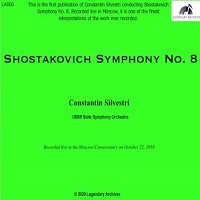 LA003: SHOSTAKOVICH Symphony No.8: Constantin Silvestri
conducting the USSR State Symphony Orchestra live at the Moscow
Conservatory on 22 October 1958 [61:59]. ADD mono from
Legendary Archives. Very little is left of Silvestri conducting Shostakovich; apart from this
Legendary Archives download, I’ve been able to locate only one
download-only offering on the BnF label: Symphony No.5 with the VPO (1962),
which was not well received. The Vienna orchestra can’t have been too
familiar with Shostakovich at that time, but Silvestri conducting his
Eighth in Moscow with the USSR State Symphony must have been akin to
carrying coals to Newcastle.
LA003: SHOSTAKOVICH Symphony No.8: Constantin Silvestri
conducting the USSR State Symphony Orchestra live at the Moscow
Conservatory on 22 October 1958 [61:59]. ADD mono from
Legendary Archives. Very little is left of Silvestri conducting Shostakovich; apart from this
Legendary Archives download, I’ve been able to locate only one
download-only offering on the BnF label: Symphony No.5 with the VPO (1962),
which was not well received. The Vienna orchestra can’t have been too
familiar with Shostakovich at that time, but Silvestri conducting his
Eighth in Moscow with the USSR State Symphony must have been akin to
carrying coals to Newcastle.
It’s in mono, with a few coughs and splutters, and sounds a bit growly
below and thin on top, but that’s not inappropriate for the music’s often
bleak tone – this really was not the work that Stalin had been hoping to
raise spirits as the war was finally turning in the Allies’ favour. Hoping
that the Ninth would be celebratory – it wasn’t – the authorities made the
best of it by calling the Eighth the ‘Stalingrad’ Symphony.
Dan Morgan thought the Mravinsky recording of this symphony ‘a mandatory
purchase’ (Alto ALC1150 –
Spring 2017/2) but Shostakovich lovers should have this Silvestri recording, too. (See
above for Presto CD reissue of the Haitink recording).
 LA004: SHOSTAKOVICH Symphony No.12
in d minor, Op.112, ‘The Year 1917’ [36:59]: the Moscow premiere broadcast
from Konstantin Ivanov with the USSR State Symphony Orchestra, recorded
live in the Moscow Conservatory on 15 October 1961, and never previously
released, is even more special, especially as it comes with a commentary on
the music by the composer, briefly and in Russian, of course. Recorded
off-air, with two short dropouts in the broadcast, it requires even more
tolerance than most of this series. It sounds as if the broadcast was in
AM, rather than FM; where many of these releases are shrill and a bit
papery, this is muddy at first, but it improves, and it’s worth
persevering. ADD mono from
Legendary Archives.
LA004: SHOSTAKOVICH Symphony No.12
in d minor, Op.112, ‘The Year 1917’ [36:59]: the Moscow premiere broadcast
from Konstantin Ivanov with the USSR State Symphony Orchestra, recorded
live in the Moscow Conservatory on 15 October 1961, and never previously
released, is even more special, especially as it comes with a commentary on
the music by the composer, briefly and in Russian, of course. Recorded
off-air, with two short dropouts in the broadcast, it requires even more
tolerance than most of this series. It sounds as if the broadcast was in
AM, rather than FM; where many of these releases are shrill and a bit
papery, this is muddy at first, but it improves, and it’s worth
persevering. ADD mono from
Legendary Archives.
The only other generally available recording of Ivanov’s Shostakovich comes
in the form of his account of the ‘Leningrad’ Symphony, also with the USSR
State Orchestra (Alto ALC1241, budget price, or Complete Symphonies:
Legendary Russian Composers ALC3143, 12 CDs, around £40). Rob Barnett
described Ivanov on another Shostakovich recording as ‘ringingly authentic’
–
review
– and this performance of No.12 must be regarded as definitive.
That complete set includes Rudolf Barshai’s highly-regarded WDR recording
of No.12. Ivanov outpaces him in three of the movements, making the
climaxes even more climactic, but he gives much more weight to the second
movement, unfortunately punctuated by the occasional cough, but it was a
live performance and the Moscow Autumn had set in. Even Mark Wigglesworth,
on a well-liked recording with the Netherlands Philharmonic, sounds a
little tame by comparison, though the SACD or 24-bit download is obviously
much more truthful (BIS-1563, with No.9 –
review).
I’ve never really subscribed to the idea that the Twelfth is the weakest of
the Shostakovich symphonies, especially having heard the Rozhdestvensky
recording with the USSSR Ministry of Culture Orchestra (1983), which used
to be available from Olympia (OCD200). I’m even less inclined to that
opinion after hearing this Russian recording.
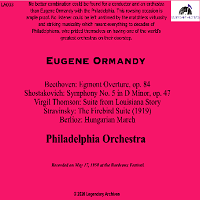 LA033: Eugene Ormandy conducting the Philadelphia Orchestra at the Bordeaux
Festival on 17 May 1958 must have been quite an occasion. It’s an
interesting programme, too:BEETHOVEN Egmont Overture, Op.84, SHOSTAKOVICH Symphony No.5 in d minor, Op.47,Virgil Thomson Suite from Louisiana Story,STRAVINSKY Firebird Suite (1919 version) and BERLIOZ Hungarian March. [98:51] The sound is resolutely
mono; like most of these releases, it requires a deal of tolerance and, of
course, there are more recent recordings of Ormandy in much of this music –
the Shostakovich, for example, in a budget-price 3-CD set (Sony
19439704792: Symphonies 1, 4, 5 and 10, Cello Concerto No.1 and Polka from The Golden Age). Better still, Dutton have recently released
Ormandy’s Symphonies Nos. 5 and 15 and other music on SACD –
review
– but these live performances are special. ADD mono from
Legendary Archives.
LA033: Eugene Ormandy conducting the Philadelphia Orchestra at the Bordeaux
Festival on 17 May 1958 must have been quite an occasion. It’s an
interesting programme, too:BEETHOVEN Egmont Overture, Op.84, SHOSTAKOVICH Symphony No.5 in d minor, Op.47,Virgil Thomson Suite from Louisiana Story,STRAVINSKY Firebird Suite (1919 version) and BERLIOZ Hungarian March. [98:51] The sound is resolutely
mono; like most of these releases, it requires a deal of tolerance and, of
course, there are more recent recordings of Ormandy in much of this music –
the Shostakovich, for example, in a budget-price 3-CD set (Sony
19439704792: Symphonies 1, 4, 5 and 10, Cello Concerto No.1 and Polka from The Golden Age). Better still, Dutton have recently released
Ormandy’s Symphonies Nos. 5 and 15 and other music on SACD –
review
– but these live performances are special. ADD mono from
Legendary Archives.
[As I was completing this review, I learned that this recording is no
longer on offer. I do hope it will be possible to release it again in
future, so I’ve left the review in place to emphasise that hope.]
 LA025: MAHLER Symphony No.7
in e minor, live from the Vienna Philharmonic Orchestra and Rafael Kubelík
in the Musikverein, Vienna, on 19 and 20 November 1960. ADD/mono from
Legendary Archives.
[75:06] Apparently, this was the first time the VPO had performed this
symphony, now frequently to be heard in the concert hall or on record, for
almost 30 years, and only the fourth time it had been given by them. That’s
not to say that the orchestra was anti-Mahler: they had recorded Das Lied von der Erde with Bruno Walter as early as 1937 –
complete on seven 12” 78 rpm records, costing the princely sum of two
guineas (£2.10, but multiply that by at least 50 for today’s equivalent).
LA025: MAHLER Symphony No.7
in e minor, live from the Vienna Philharmonic Orchestra and Rafael Kubelík
in the Musikverein, Vienna, on 19 and 20 November 1960. ADD/mono from
Legendary Archives.
[75:06] Apparently, this was the first time the VPO had performed this
symphony, now frequently to be heard in the concert hall or on record, for
almost 30 years, and only the fourth time it had been given by them. That’s
not to say that the orchestra was anti-Mahler: they had recorded Das Lied von der Erde with Bruno Walter as early as 1937 –
complete on seven 12” 78 rpm records, costing the princely sum of two
guineas (£2.10, but multiply that by at least 50 for today’s equivalent).
This recording is taken from the two performances that Kubelík gave on
subsequent days. Kubelík’s Mahler has always appealed to me – his recording
of the First Symphony is still my version of choice (DG Originals 4497352,
download only). His complete DG set of the Mahler symphonies remains
available on 4637382, 10 CDs.
The sound of the 1960 performance is dry and a little fragile, but
tolerable, and the performance brings the extra frisson of a live
performance. Good as the Bavarian Radio Orchestra is on the DG set, and
rusty though the VPO may have been in this symphony, there is something
special about their playing – if only the recording quality could convey it
more fully.
 LA039
brings a recording of BRAHMS Symphony No.3 from Carl
Schuricht, very late in his career, conducting the Munich Philharmonic
Orchestra (live, Herkulessaal, Munich, May 19, 1963). There are a few
extant recordings of Schuricht’s Brahms, especially of Symphony No.2, but
the only other way to find him conducting the Third is, I believe, via the
complete SWR 30-CD set.
LA039
brings a recording of BRAHMS Symphony No.3 from Carl
Schuricht, very late in his career, conducting the Munich Philharmonic
Orchestra (live, Herkulessaal, Munich, May 19, 1963). There are a few
extant recordings of Schuricht’s Brahms, especially of Symphony No.2, but
the only other way to find him conducting the Third is, I believe, via the
complete SWR 30-CD set.
This account is as rough-hewn where it matters as Klemperer’s (Warner
4043382, 4 CDs), still my go-to conductor in this symphony. Both open in a
way that lets us know that they (and Brahms) mean business, with Schuricht
more expeditious than Klemperer, but there’s tenderness, too, especially in
the second movement – taken, like the other movements, at much the same
well-paced tempo as Klemperer. The recording needs a good deal more
tolerance than the Klemperer, which was recorded commercially by EMI, but
the ear soon adjusts and I enjoyed hearing this vigorous performance. Being
recorded live, it avoids the clicks and bumps which accompany the BNF
transfer of Schuricht’s Brahms Symphony No.2.
At 32:13, it’s rather short value, but the price of 10 Euros (more if you
can afford to assist what is, after all, a good cause) is not excessive. In
mp3, flac and other formats from
Legendary Archives.
Those who hate applause should be warned that there is a (very brief)
segment from an otherwise quiet audience.
 LA043: Richard STRAUSS Tod und Verklärung, Op.24
[23:07], and BRUCKNER Symphony No.3 in d minor [58:42]:
Munich Philharmonic Orchestra/Hans Knappertsbusch, recorded live in the
Herkulessaal, Munich, 16 January, 1964. Here is Kna conducting the work of
two composers with whom he had long been associated, and with an orchestra
whom he had worked with for decades. Like the Schuricht Brahms, the
recording preserves the veteran conductor near the end of his career, so
even later than the late-50s Wagner with the VPO and Birgit Nilsson (Decca
4842404, download only, with the Kirsten Flagstad, Set Svanholm and SoltiTodesverkündigung from Walküre) or the 1956 Wesendonck Lieder with Kirsten Flagstad and the VPO (Decca
4684862, with Flagstad and Boult in Mahler).
LA043: Richard STRAUSS Tod und Verklärung, Op.24
[23:07], and BRUCKNER Symphony No.3 in d minor [58:42]:
Munich Philharmonic Orchestra/Hans Knappertsbusch, recorded live in the
Herkulessaal, Munich, 16 January, 1964. Here is Kna conducting the work of
two composers with whom he had long been associated, and with an orchestra
whom he had worked with for decades. Like the Schuricht Brahms, the
recording preserves the veteran conductor near the end of his career, so
even later than the late-50s Wagner with the VPO and Birgit Nilsson (Decca
4842404, download only, with the Kirsten Flagstad, Set Svanholm and SoltiTodesverkündigung from Walküre) or the 1956 Wesendonck Lieder with Kirsten Flagstad and the VPO (Decca
4684862, with Flagstad and Boult in Mahler).
The recording is more secure than the Schuricht Brahms, though no match for
a commercial recording of this date, or even the 1954 Decca recording of
the Bruckner Third with the VPO (Eloquence 4828800, 4 CDs, with Symphonies
Nos. 4, 5 and 8 –
review). Like the 1954 recording, the ‘Wagner’ symphony is presented with the
cuts which were customary at the time, but the performance shows no sign of
flagging, so, with tolerable, albeit congested sound, and a significant and
powerful filler in the Strauss, this is one of my picks from my limited
initial exploration of the
Legendary Archives
catalogue.
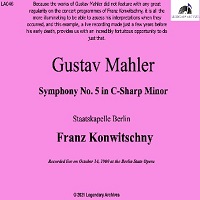 LA045: MAHLER Symphony No.5
in c-sharp minor: Staatskapelle Berlin/Franz Konwitschny – rec. Live,
Berlin State Opera, 14 October 1960 [68:56]. ADD/mono. Very little remains
available of Konwitschny’s commercial recordings, so this live recording of
Mahler’s Fifth from late in his career is of special interest. As if to
prove the thesis that performances of the fourth movement, adagietto, have become slower over the years, Konwitschny takes
just over eight minutes, where the recent Vänskä Minnesota recording lasts
12:39 (BIS-2226 SACD). I thought the BIS far too slow, and verging on the
lethargic –
review
– and John Quinn thought it a major disappointment –
review
– while Konwitschny gets all the emotion out of the movement without
milking it. (Dan Morgan was even more forthright about the Vänskä adagietto: ‘unforgiveable sluggish … stops this performance in its
tracks’ –
review).
LA045: MAHLER Symphony No.5
in c-sharp minor: Staatskapelle Berlin/Franz Konwitschny – rec. Live,
Berlin State Opera, 14 October 1960 [68:56]. ADD/mono. Very little remains
available of Konwitschny’s commercial recordings, so this live recording of
Mahler’s Fifth from late in his career is of special interest. As if to
prove the thesis that performances of the fourth movement, adagietto, have become slower over the years, Konwitschny takes
just over eight minutes, where the recent Vänskä Minnesota recording lasts
12:39 (BIS-2226 SACD). I thought the BIS far too slow, and verging on the
lethargic –
review
– and John Quinn thought it a major disappointment –
review
– while Konwitschny gets all the emotion out of the movement without
milking it. (Dan Morgan was even more forthright about the Vänskä adagietto: ‘unforgiveable sluggish … stops this performance in its
tracks’ –
review).
As with the other recordings which I have tried from Legendary Archives,
the recording requires a degree of tolerance, but the ear adjusts. There’s
brief applause fore and aft, which will put off those who dislike it.

 LA047
from
Legendary Archives
[48:36] brings the biggest and most pleasant surprise of these releases: Alan Bush conducting
the Leipzig Radio Symphony Orchestra in studio recordings of VAUGHAN WILLIAMS: the Fantasia on a Theme of Thomas Tallis [13:24] (16 September 1953) and Symphony No.5 in
D [35:09] (7 February 1955). All ADD/mono. I didn’t think that VW’s music
had made an impression in East Germany as early as that, or that the
Leipzig players would have latched onto the idiom. It no doubt helped that
they had an English conductor, directing music by a friend and colleague.
The playing is not of the very finest, but Bush seems to have rehearsed
them thoroughly, and his commitment to the music makes this release
eminently worth hearing. The recording may be rather thin and dry, but not
much more so than the classic Boult recording of the Fifth for Decca. I’m
amazed to find this recording of the symphony almost as idiomatic as the
Boult, less at peace with itself, more prescient of the mood of the Sixth
Symphony, and in very tolerable sound for its age.
LA047
from
Legendary Archives
[48:36] brings the biggest and most pleasant surprise of these releases: Alan Bush conducting
the Leipzig Radio Symphony Orchestra in studio recordings of VAUGHAN WILLIAMS: the Fantasia on a Theme of Thomas Tallis [13:24] (16 September 1953) and Symphony No.5 in
D [35:09] (7 February 1955). All ADD/mono. I didn’t think that VW’s music
had made an impression in East Germany as early as that, or that the
Leipzig players would have latched onto the idiom. It no doubt helped that
they had an English conductor, directing music by a friend and colleague.
The playing is not of the very finest, but Bush seems to have rehearsed
them thoroughly, and his commitment to the music makes this release
eminently worth hearing. The recording may be rather thin and dry, but not
much more so than the classic Boult recording of the Fifth for Decca. I’m
amazed to find this recording of the symphony almost as idiomatic as the
Boult, less at peace with itself, more prescient of the mood of the Sixth
Symphony, and in very tolerable sound for its age.



 All Nimbus reviews
All Nimbus reviews








